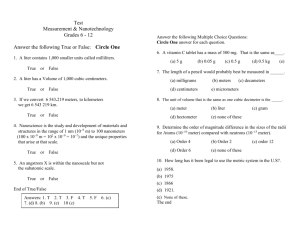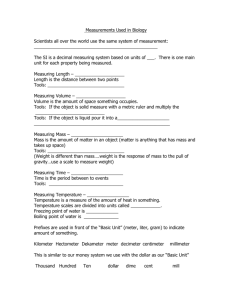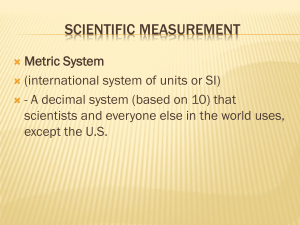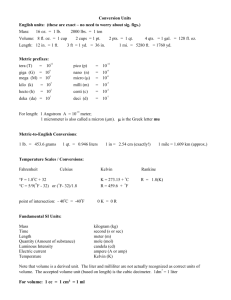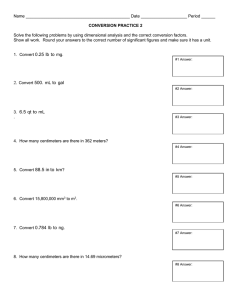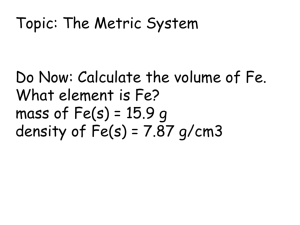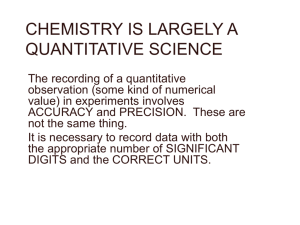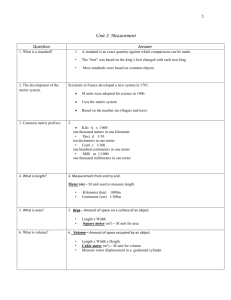10 -3
advertisement
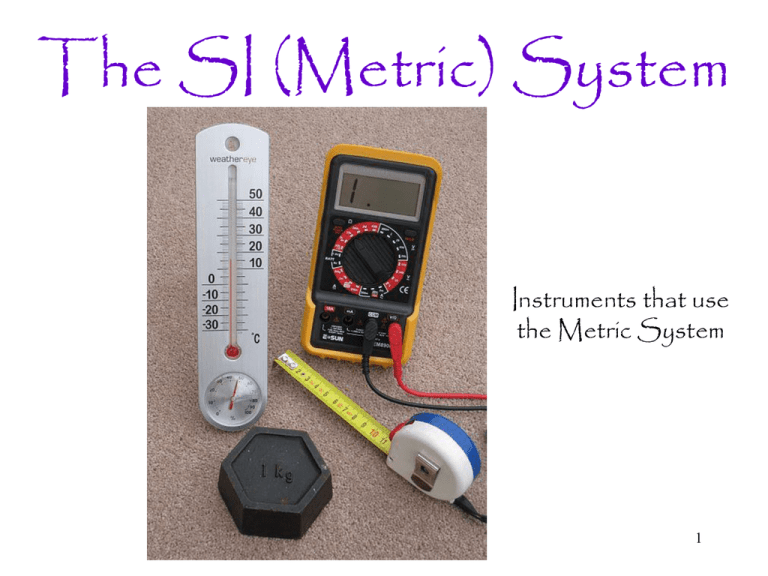
The SI (Metric) System Instruments that use the Metric System 1 The Standard Units • Scientists generally report results in an agreed upon International System. • The SI System Aka Système International Quantity Measured Mass Length Volume Time Temperature Name of Unit Abbreviation kilogram meter liter seconds Kelvin kg m L s K 2 International Usage of the SI System Freeway Sign in China 3 Length • Measure of the two-dimensional distance an object covers. • SI unit = meter About 3½ inches longer than a yard. • 1 meter = one ten-millionth the distance from the North Pole to the Equator = distance between marks on standard metal rod in a Paris vault = distance covered by a certain number of wavelengths of a special color of light • Commonly use centimeters (cm). 1 cm ~ width of your pinky nail 1 m = 100 cm 1 cm = 0.01 m = 10 mm 1 inch = 2.54 cm (exactly) 4 Mass • Measure of the amount of matter present in an object. • SI unit = kilogram (kg) About 2 lbs. 3 oz. • Commonly measure mass in grams (g) or milligrams (mg). 1 kg = 2.2046 pounds, 1 lbs. = 453.59 g 1 kg = 1000 g = 103 g, 1 g = 1000 mg = 103 mg 1 g = 0.001 kg = 10-3 kg, 1 mg = 0.001 g = 10-3 g 5 Estimate the Mass of a Quarter in Grams • 2.5 g • 5.5 g • 8.5 g • 10 g • 15 g 6 Estimate the Mass of a Quarter in Grams, Continued • 2.5 g • 5.5 g • 8.5 g • 10 g • 15 g 7 Time • Measure of the duration of an event. • SI units = second (s) • 1 s is defined as the period of time it takes for a specific number of radiation events of a specific transition from cesium-133. 8 Temperature • Measure of the average amount of kinetic energy (molecular motion). higher temperature = larger average kinetic energy SI unit = Kelvin (K) 9 Related Units in the SI System • All units in the SI system are related to the standard unit by a power of 10. • The power of 10 is indicated by a prefix. • The prefixes are always the same, regardless of the standard unit. • It is usually best to measure a property in a unit close to the size of the property. It reduces the number of confusing zeros. 10 Common Prefixes in the SI System Prefix Symbol Decimal Equivalent Power of 10 1,000,000 Base x 106 1,000 Base x 103 mega- M kilo- k deci- d 0.1 Base x 10-1 centi- c 0.01 Base x 10-2 milli- m 0.001 Base x 10-3 micro- m or mc 0.000 001 Base x 10-6 nano- n 0.000 000 001 Base x 10-9 11 Prefixes Used to Modify Standard Unit • kilo = 1000 times base unit = 103 1 km = 1000 m = 103 m • deci = 0.1 times the base unit = 10-1 1 dL = 0.1 L = 10-1 L; 1 L = 10 dL • centi = 0.01 times the base unit = 10-2 1 cm = 0.01 m = 10-2 m; 1 m = 100 cm • milli = 0.001 times the base unit = 10-3 1 mg = 0.001 g = 10-3 g; 1 g = 1000 mg • micro = 10-6 times the base unit 1 m = 10-6 m; 106 m = 1 m • nano = 10-9 times the base unit 1 nL = 10-9L; 109 nL = 1 L 12 Practice—Which of the Following Units Would Be Best Used for Measuring the Diameter of a Quarter? a) kilometer b) meter c) centimeter d) micrometer e) megameters 13 Practice—Which of the Following Units Would Be Best Used for Measuring the Diameter of a Quarter?, Continued a) kilometer b) meter c) centimeter d) micrometer e) megameters 14 Volume • Derived unit. Any length unit cubed. • Measure of the amount of space occupied. • SI unit = cubic meter (m3) • Commonly measure liquid or gas volume in milliliters (mL). 1 L is slightly larger than 1 quart. 1 L = 1 dm3 = 1000 mL = 103 mL 1 mL = 0.001 L = 10-3 L 1 mL = 1 cm3 15 SI Prefix Conversions 0.2 20 cm = ______________ m 32 0.032 L = ______________ mL 45,000 45 mm = ______________ nm 0.0805 805 dm = ______________ km Common Units and Their Equivalents Length 1 kilometer (km) 1 meter (m) 1 meter (m) 1 foot (ft) 1 inch (in.) = = = = = 0.6214 mile (mi) 39.37 inches (in.) 1.094 yards (yd) 30.48 centimeters (cm) 2.54 centimeters (cm) exactly 17 Common Units and Their Equivalents, Continued Mass 1 kilogram (km) 1 pound (lb) 1 ounce (oz) = = = 2.205 pounds (lb) 453.59 grams (g) 28.35 (g) Volume 1 liter (L) 1 liter (L) 1 liter (L) 1 U.S. gallon (gal) = 1000 milliliters (mL) = 1000 cubic centimeters (cm3) = 1.057 quarts (qt) = 3.785 liters (L) 18 Which Is Larger? • 1 yard or 1 meter? • 1 mile or 1 km? • 1 cm or 1 inch? • 1 kg or 1 lb? • 1 mg or 1 mg? • 1 qt or 1 L? • 1 L or 1 gal? • 1 gal or 1000 cm3? 19 Which Is Larger?, Continued • 1 yard or 1 meter? • 1 mile of 1 km? • 1 cm or 1 inch? • 1 kg or 1 lb? • 1 mg or 1 ng? • 1 qt or 1 L? • 1 L or 1 gal? • 1 gal or 1000 cm3? 20
